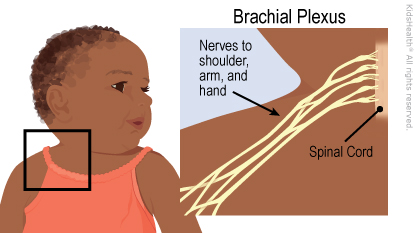Brachial Plexus Injury: How to Care for Your Infant
The brachial plexus is a bundle of nerves between the neck and shoulder. These nerves send signals from the spinal cord to the shoulder, arm, and hand, providing feeling and muscle control. A baby's brachial plexus can be injured if the neck stretches to one side during a difficult childbirth. When this happens, the arm on that side doesn't move well. It might look weak or limp, and it can have less feeling. Most babies recover fully with time.


-
Make sure you do the recommended exercises or stretches.
-
If you think your child has pain, ask your health care provider if it's OK to give acetaminophen (such as Tylenol® or a store brand). Do not give ibuprofen (such as Advil®, Motrin®, or a store brand) to babies under 6 months old. Do not give aspirin to children of any age, as it has been linked to a rare but serious illness called Reye syndrome.
-
Put your child to sleep on their back. This is the safest position for babies to sleep. Also, sleeping on the injured shoulder can hurt the nerves.
-
Go to any follow-up medical visits as directed.

Your child:
-
doesn't improve over the next 3 months
-
seems weak in a different part of the body
-
has red areas or sores on the injured arm

How is a brachial plexus injury treated? Often the injury will recover on its own with no treatment. Physical therapy and occupational therapy can help strengthen the chest, shoulder, and arm muscles, and keep them flexible. Rarely, a baby might need surgery to fix a torn nerve.
How long does it take to heal? Many infants with a brachial plexus injury get better after a few months to a year, though it may take longer. If there is no improvement after the first few months, the health care provider might suggest surgery.